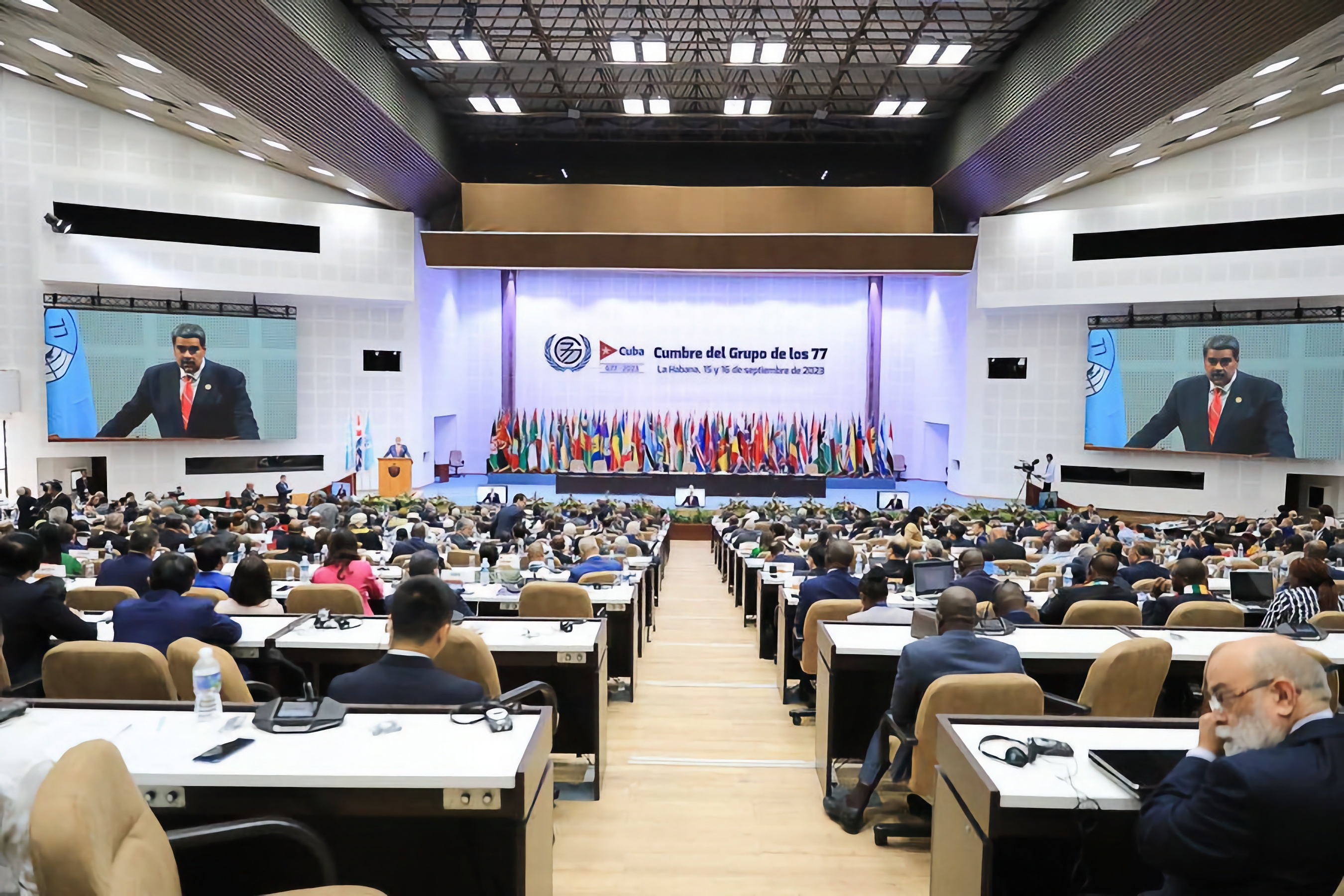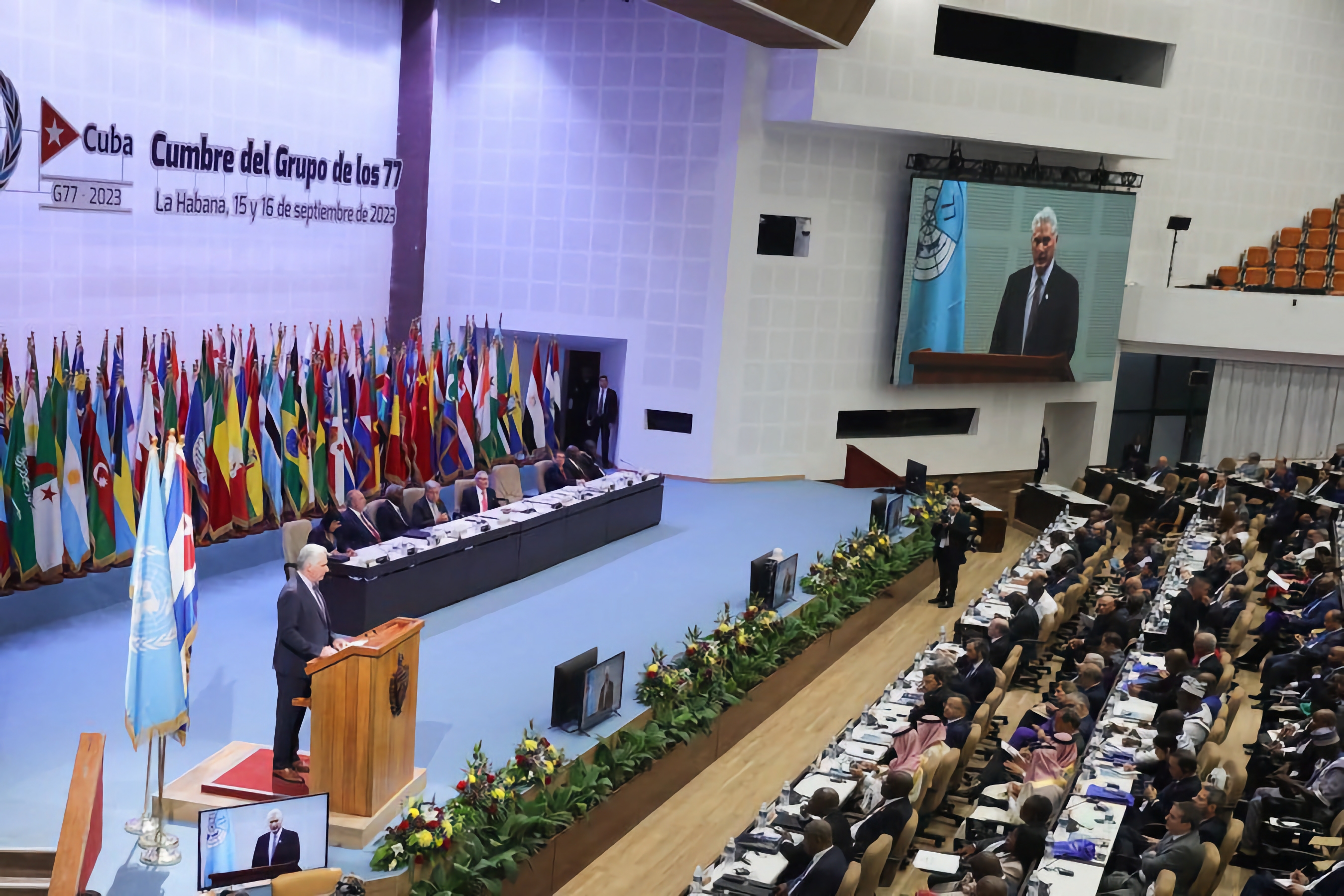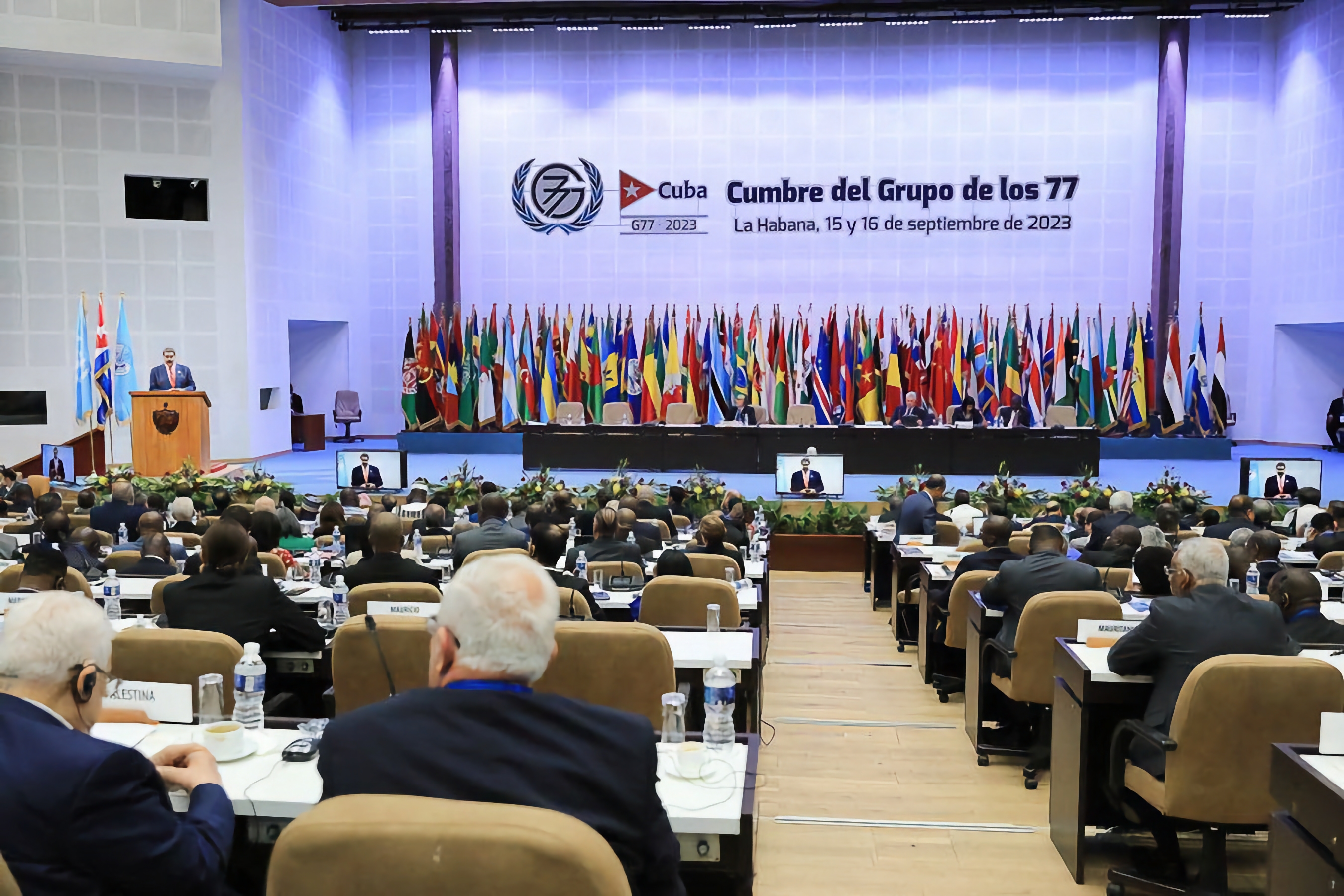


Cuba, as the largest of the Antilles, attracted the greed of Yankee Imperialism. The country’s arduous and protracted struggle to defend its sovereignty has garnered admiration and respect from people around the world. Recently, the member countries of the G77 and China gathered in Havana to establish a united front in defense of the rights of the Global South. Their goal is to confront the hegemony of the North and work towards a New International Order.
In Havana, representatives and leaders from 134 countries convened for two days at the G77 plus China Summit. They advocate for a fairer world order, new world governance with a balance of powers, a revamped financial architecture, and a sustainable economic model that ensures more dignified living standards for all the inhabitants of the planet.
Cuban President Miguel Díaz Canel declared, “For all the time during which the North accommodated the world to its interests at the expense of the rest, it is now the South’s turn to change the rules of the game!”

The G77 was established in 1964 during the Cold War within the Non-Aligned Movement, comprising 77 countries from the Global Majority. China joined in 1992, and their numbers have since expanded to 134, making it the largest alliance in the world. The group represents 80% of the global population and possess two-thirds of the votes within the UN and the WHO.
Since its creation, this group proposed to jointly solve the pressing problems for “Third World” nations, asserting the right to freely develop their economies and raise the standard of living of their population.
Cuba, once again hosting this event, remains at the forefront of the struggle for a New World Order. Now, almost 60 years later, the challenges are more urgent, as the nations of the Global South bear the brunt of problems generated by capitalism– including increasing global poverty, burdensome external debt, food insecurity, climate catastrophes, geopolitical tensions and conflicts, the digital divide, technological underdevelopment, and more. We are in a time when several African countries are fighting for liberation and more countries are embracing new centers of power like BRICS+, while rejecting unilateral coercive measures that infringe upon basic human rights such as food, health, and the right to development.
Cuban President Miguel Díaz Canel declared, “It will always be the time for Unity! But today it is an imperative, the greatest of all emergencies!” He added, “Count on Cuba and its commitment to work, tirelessly, in defense of the interests of our nations. Cuba has actively participated with significant contributions in different areas, promoting cooperation to contribute to equitable development. The island has had to endure a suffocating economic blockade by the Empire and its henchmen, in the face of this reality and with the limitations imposed by the aforementioned sanctions, aggressions, and current challenges for development, it has been able to be a leader in the field of science, technology and innovation.”
Canel denounced the current Economic Order imposed by Yankee Imperialism and its satellites as unjust and unsustainable. He called for the democratization of the international relations system, highlighting that many countries are wrongly labeled as poor when they should be recognized as impoverished due to neocolonial subjugation.
The Cuban president also urged the removal of barriers hindering knowledge-sharing with developing countries and questioned the global growth in military spending, arguing that these resources could be redirected to support populations. Estimates suggest that 9% of this spending could finance a decade of climate change adaptation, caused precisely by the greed of wealthy nations, while 7% could cover global vaccination against any health crisis, reducing inequality among the less fortunate.
For his part, Venezuelan President Nicolás Maduro said, “The G77 and China must promote a powerful initiative in the United Nations to end unilateral coercive measures against the countries of the world.”
“It is proposed to promote High Impact cooperation in: education, science and technology.” Maduro continued. “For example, during the pandemic, the North called all the companies that produced antivirals, medicines and that produced vaccines and threaten them not to sell something from Venezuela. We had to resort to the direct and supportive relationship that allowed Venezuela to have access to medicines, antivirals and then vaccines in the harshest moments of 2020 and 2021. And it was thanks to the solidarity of the support of China, Russia, Cuba, India and Turkey that Venezuela, blockaded and persecuted, was able to access the medicine it needed!”
In his speech, Lula Da Silva, President of Brazil and President Pro Tempore of G20, considered that: “The G77 Nations and China must strengthen themselves in light of the Fourth Industrial Revolution, which revolves around the fields of artificial intelligence.” Lula added that, “A common vision must be forged that takes into account the concerns of low- and middle-income countries.” He also proposed “a joint action in order to ensure that the Energy Transition and the Industrial Revolution are not left in the hands of a handful of economies.” He pointed out that they already have a broad and detailed diagnosis of the problem; all that remains is to get to work as soon as possible.
Xiomara Castro, President of Honduras and CELAC Pro Tempore President, questioned the purpose of international organizations like the G77, World Bank, CELAC, and the United Nations if they cannot eliminate unjust blockades, sanctions, neocolonialism, the hegemony of capital over human welfare, and the war promoted by the military-industrial complex, causing immense suffering and pain in the world.
Argentine President Alberto Fernández echoed this sentiment. He stated that the Global South has a significant opportunity to demand equality in this changing era. He also urged the international community to create a new financial system, as the current one operates with a discriminatory logic of the past, perpetuating crises.
Fernández pointed out that American Hegemony is no longer what it once was, and Europe is in crisis. He identified the rise of two giants, China and India, which are reshaping international trade daily. And he emphasized the importance of BRICS+ as a vital actor in the New Order.
The Argentine President also highlighted the Health Crisis as an event that exposed prevailing inequality, with 90% of vaccines withheld by 10 countries. He revealed that 11 fortunes possess as much wealth as 40% of humanity, and 1.2% of adults own 50% of the world’s wealth. He stressed that inequality necessitates a rethinking of the world, where the G77 and China can play a significant role economically. Finally, Fernández condemned the policies of the Monetary Fund and the World Bank.

The UN Secretary General described the G77 and China as “The Voice of the Global South” and the largest group of countries on the international stage. During the Forum, Gutiérrez pointed out that the countries comprising this bloc have protected hundreds of millions of people. However, he also noted that the world has been failing developing countries, with increasing poverty, hunger, rising prices, exorbitant debt, and more frequent climate disasters.
Gutiérrez concluded that change is imperative, requiring global action to promote an international system that “defends human rights.” He acknowledged the view that the Security Council, the World Bank, and the International Monetary Fund belong to a past era when many developing countries were chained by a colonial order. He stressed that a new international system would necessary to address challenges.
UN Secretary General Antonio Gutiérrez warned that “the world is failing developing countries.” But this statement should be more precise: it’s not the world failing these countries but a handful of rulers who believe they own the planet’s lands, natural resources, and future.
Numerous leaders and representatives shared the need to strengthen unity among their nations and take the necessary actions to achieve a new Fair World Order.
The people of the Global South are rising with revolutionary conviction. With these positions and demands, the 134 Countries of the G77 plus China are currently presenting themselves at the 78th Session of the UN General Assembly, convinced that the time has come for the peoples!
Venceremos!✊🏽